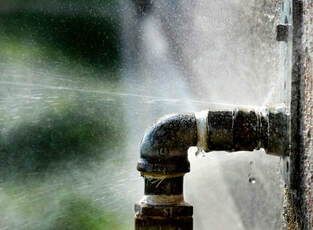Find Out Clever Ways to Spot Hidden Leaking Water Lines
Find Out Clever Ways to Spot Hidden Leaking Water Lines
Blog Article
What're your thoughts and feelings on Finding hidden leaks?

Early discovery of leaking water lines can mitigate a possible catastrophe. Some tiny water leakages may not be noticeable.
1. Take A Look At the Water Meter
Every house has a water meter. Examining it is a surefire way that helps you uncover leakages. For beginners, switch off all the water resources. Ensure no person will flush, make use of the faucet, shower, run the washing equipment or dishwasher. From there, go to the meter as well as watch if it will certainly alter. Because no one is utilizing it, there need to be no motions. That indicates a fast-moving leakage if it moves. Likewise, if you identify no changes, wait a hr or two as well as check back once more. This indicates you might have a slow leak that might even be below ground.
2. Inspect Water Consumption
Analyze your water costs and track your water consumption. As the one paying it, you must observe if there are any type of inconsistencies. If you detect sudden changes, despite your consumption coinciding, it suggests that you have leaks in your plumbing system. Remember, your water bill need to drop under the exact same variety monthly. A sudden spike in your costs shows a fast-moving leak.
A consistent rise every month, even with the exact same routines, reveals you have a slow-moving leak that's also slowly intensifying. Call a plumber to completely inspect your home, particularly if you really feel a cozy area on your floor with piping beneath.
3. Do a Food Coloring Test
When it comes to water consumption, 30% comes from toilets. If the color somehow infiltrates your dish throughout that time without flushing, there's a leakage in between the container and also bowl.
4. Asses Exterior Lines
Don't fail to remember to check your outside water lines also. Ought to water permeate out of the connection, you have a loose rubber gasket. One little leakage can waste heaps of water and surge your water expense.
5. Evaluate and Evaluate the Circumstance
House owners need to make it a behavior to examine under the sink counters and also inside closets for any kind of bad odor or mold and mildew development. These 2 warnings suggest a leak so prompt attention is required. Doing regular inspections, also bi-annually, can conserve you from a major problem.
Check for discolorations as well as weakening as most pipes as well as home appliances have a life expectancy. If you presume leaking water lines in your plumbing system, do not wait for it to escalate.
Early detection of dripping water lines can minimize a prospective calamity. Some tiny water leaks may not be visible. Checking it is a guaranteed means that aids you uncover leakages. One tiny leak can lose tons of water and also surge your water expense.
If you suspect dripping water lines in your plumbing system, do not wait for it to intensify.
5 Signs that Your Home Has a Hidden Leak
Your water bill is unusually high without explanation
Generally, your water bill tends to stay consistent throughout the year as long as the same number of people live in your household year round. The bill might be higher during certain times of the year, such as summer, when your lawn may require more watering than it does in cooler months. However, if you notice a rise in your water bill that you can’t explain, it’s an indicator that there’s a hidden leak somewhere in your home.
You hear running water
One of the biggest signs that you have a water leak is the sound of rushing water when no plumbing fixtures are on and when no water-using appliances are running. If you hear running water in your walls when no water is being used anywhere in your home, locate your home’s main water shut-off valve, shut off your water supply, and contact a plumber at once.
Your home smells musty
Hidden leaks often occur in dark spaces, such as behind walls or under carpeting. Incidentally, darkness and moisture can create an ideal breeding environment for mold or mildew. If you start to smell mildew or the scent of rotting wood or stagnant water around your home, it’s a fair bet that a leak is the culprit.
You find wet spots around your home
The wet spots usually show up as moist areas in your carpeting. If your home has a basement level, puddles on the floor could indicate a slab leak. Outside, unexplainable puddles or lush, green patches in your yard often mean that there’s a leak in your sewer line or main water line.
You have stains, bubbles, or condensation on your walls/ceiling
Stains or condensation on your walls or ceiling are both major signs of a hidden leak. Also, drywall (AKA. sheetrock) is very absorbent, and as it takes on more water from a leak behind a wall, it will start to bubble, swell, or warp. If you see this happening in your home, don’t wait to contact a plumber before the water damage spreads.
https://www.ezflowplumbingaz.com/blog/2019/june/5-signs-that-your-home-has-a-hidden-leak/

As a keen person who reads about Locating water leaks, I think sharing that article post was smart. Are you aware of someone else who is sincerely interested in the topic? Why not share it. We enjoy reading our article about Detecting hidden plumbing leaks.
Professional help? One call away. Report this page